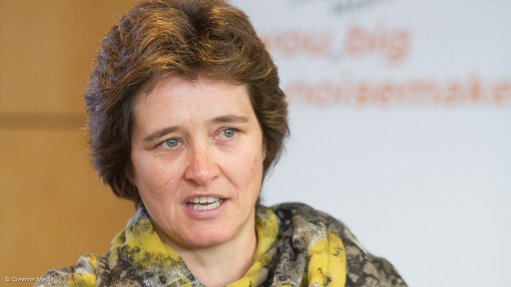
JSE CE Nicky Newton-King
Photo by: Duane Daws
The Fourth Industrial Revolution is a fast train coming through town. South Africa can choose to jump on board or not, or – in the words of Nicky Newton-King, CE of the JSE – co-create the future, or let it happen around us.
Newton-King was part of a panel of leading South African businesspeople talking at a business breakfast hosted by Brand SA at the World Economic Forum in Davos on Wednesday.
The business breakfast is taking place as part of the lead-up programme to the World Economic Forum’s annual meeting which brings together world leaders from business, government, international organisations, academia and civil society, to discuss the global economy. The WEF is taking place from January 20 to 23.
All panelists acknowledged that evidence of the Fourth Industrial Revolution was all around us, from intelligent robots and self-driving cars to neurotechnological brain enhancements and genetic editing.
Trade and Industry Minister Dr Rob Davies had earlier told the meeting that although South Africa had a lot going for it, the country was going to have to come to terms with the Fourth Industrial Revolution in order to take its rightful place in the future.
He said: “We have to get on top of this!”
Consensus on the panel was that clear and decisive leadership was needed to make the most of the opportunities created by the Fourth Industrial Revolution.
Newton-King added that we would be making a big mistake if “we could see the direction of travel but we didn’t make the calls”.
She added that the new world order changed the type of people one needed to produce. “We need to be readying people for the new world.”
Ben Kruger, group CE of Standard Bank, concurred and added that preparing people for change included helping them to want to be part of change.
Geoffrey Qhena, CE of the Industrial Development Corporation, said it was clear what had to be done but, he said, that the speed at which big ideas were implemented was absolutely key.